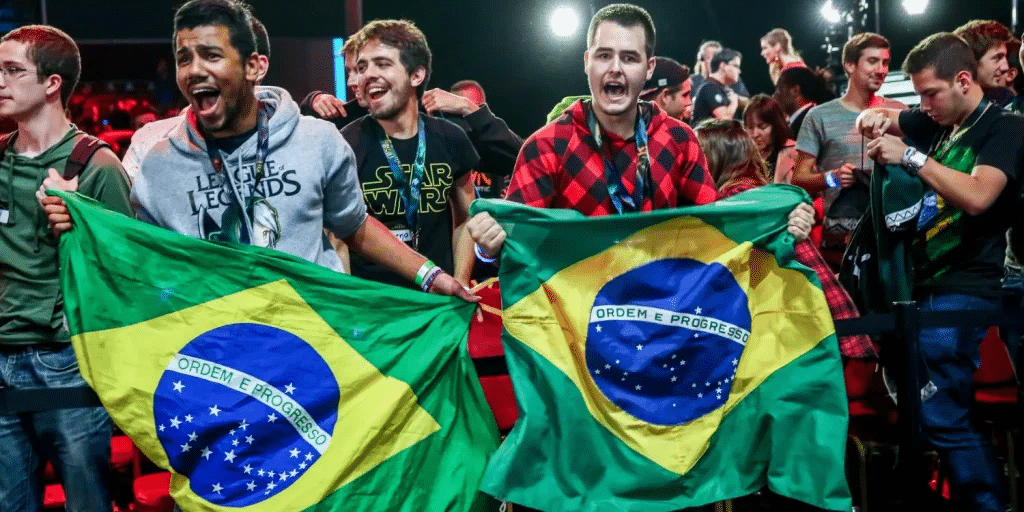Join Our Telegram channel to stay up to date on breaking news coverage
A game-changing decision just hit Brazil’s betting market.
On April 24, 2025, the Ministry of Sports officially welcomed shooter games into the legal betting fold through Portaria MESP nº 36/2025. This bold move breaks from previous restrictions and gives the green light to betting on Counter-Strike, Valorant, and Fortnite tournaments – provided they have proper developer authorization. The change marks a pivotal moment for Brazil’s gaming community and betting operators alike, aligning regulations with market demand while introducing safeguards to maintain integrity.
Key Takeaways:
- Brazil now permits betting on shooter games with developer/IP holder authorization
- Previous rules limited betting to IOC-recognized titles, excluding popular esports
- Licensed operators must register on consumer protection platforms
- The change targets Brazil’s 76 million gamers, 32% already betting on esports
- Anti-exclusivity provisions prevent monopolistic practices in the market
- Crypto betting options expected to grow alongside traditional payment methods
- Integrity monitoring systems will use AI analytics to detect match-fixing
From Olympic Restrictions to Developer-Approved Freedom
Brazil’s betting scene just got a serious upgrade. Before this change, you could only place bets on esports recognized by the International Olympic Committee (COI). That meant virtual versions of traditional sports like cycling and tennis were fair game, but the most popular competitive titles were off the table.
The COI has long kept shooter games at arm’s length, claiming they clash with “Olympic values.” This stance created a strange disconnect in a country where shooter games dominate the competitive gaming landscape. Brazilian fans could watch their favorite Counter-Strike teams compete at sold-out arenas but couldn’t legally place bets on the matches.
As gaming analyst Rafael Monteiro explains:
The previous framework ignored market reality. Brazilians love shooter games – they fill stadiums for CS tournaments while betting regulations pretended these games didn’t exist.
The new framework flips this approach on its head. Now, any esport can qualify for legal betting as long as the tournament secures proper authorization from the game developers or intellectual property owners. This shift acknowledges market reality while maintaining oversight.
The updated regulations include several key provisions:
- Developer Authorization Requirement: Tournaments must obtain licenses from game creators to qualify for legal betting markets.
- Anti-Exclusivity Clause: Game developers and betting operators cannot enter exclusive agreements that would limit market competition.
- Public Transparency: The Ministry of Sports will maintain and publish an updated list of all approved games and tournaments.
- Compliance Monitoring: Regular audits will verify that betting markets only cover properly licensed events.
André Fufuca, Brazil’s Minister of Sports, didn’t mince words about the reform’s purpose: to “expand opportunities for a rapidly growing sector.” Makes sense when you consider Brazil stands as Latin America’s biggest gaming market, with projections showing $2.8 billion in revenue by 2026, according to PwC data.
“This isn’t just about betting – it’s about recognizing esports as legitimate competitive entertainment,” Fufuca added in his statement to the press. “Brazil has world-class talent in these games. Our regulations should reflect that reality.”
Market Impact: Betting Big on Brazil’s Gaming Passion
The numbers tell an exciting story. Brazil’s online betting market already processes between R$20–30 billion ($3.6–5.4 billion) in monthly wagers, based on Central Bank figures. Adding shooter games to the mix won’t just bump those numbers – it might send them soaring.
Why such confidence? Look at the audience: Brazil has 76 million active gamers. Research from Pesquisa Game Brasil shows 32% of them already place bets on esports. That’s a massive pool of potential customers who now have access to betting markets they actually care about.
“Brazilian bettors were placing wagers on these games anyway – just through offshore sites beyond regulatory reach,” notes gambling economist Luiza Campos. “This change brings that activity into the regulated market where consumer protections apply.”
For the 170+ licensed operators in Brazil – including heavyweights like Betano, KTO, and Estrela Bet – this means they can finally offer markets for major events like the Intel Extreme Masters Rio and Valorant Champions Tour. These tournaments draw millions of viewers and now stand to generate significant betting action.
KTO spokesperson Marcelo Santos confirmed their plans: “We’ve been preparing for this change. Our esports betting platform will launch markets for CS2 and Valorant within days. The demand from our customers has been overwhelming.”
Game developers win too. Companies like Riot Games (Valorant) and Epic Games (Fortnite) gain more control through the licensing requirement, helping them protect the integrity of their competitive ecosystems. Several major developers have already announced partnership programs for tournament organizers seeking betting eligibility.
The economic impact extends beyond betting platforms. Brazil’s esports sector contributed $250 million to the national economy in 2024. With this regulatory shift, watch for increased sponsorship deals, event investment, and career opportunities throughout the gaming ecosystem.
Industry analysts project that betting-related sponsorships could boost esports tournament prize pools by 30-40% within the first year, drawing more talent into professional gaming careers. Teams like FURIA, LOUD, and paiN Gaming stand to benefit from increased commercial opportunities.
Crypto betting sites are also poised to benefit significantly from this expansion. As digital currencies gain popularity in Brazil, platforms offering Bitcoin and other cryptocurrency betting options (learn more about Bitcoin betting sites) are likely to see increased traffic from tech-savvy esports fans looking for faster transactions and enhanced privacy.
Fintech consultant Carlos Mendes explains:
Cryptocurrency and esports share similar demographics. Young, tech-literate users who value digital innovation. The overlap between crypto betting and esports betting is substantial, and this regulatory change opens the door for growth in both sectors.
Consumer Protections: Safeguarding the Expanded Market
Brazil hasn’t just opened the floodgates – they’ve installed safety measures too. The regulatory update brings several important consumer protection mechanisms:
First, all operators must register on Consumidor.gov.br, a government platform that boasts an 81% complaint resolution rate. This gives bettors a trusted channel to address issues with betting providers. Companies failing to resolve legitimate complaints risk license suspension.
“The complaint resolution system puts real power in consumers’ hands,” says consumer rights advocate Teresa Oliveira. “Most betting disputes can now be resolved without expensive legal proceedings.”
Second, plans are underway for a national self-exclusion system, set to launch between 2025 and 2026. This will allow players with gambling problems to voluntarily bar themselves from betting platforms. The system will operate across all licensed operators, closing loopholes that problem gamblers might exploit.
Health Ministry spokesperson Dr. Paulo Almeida emphasized the importance of this feature: “Self-exclusion is a proven harm reduction tool. When implemented properly, it helps vulnerable individuals regain control.”
Third, the Secretariat of Prizes and Bets (SPA) has partnered with Integrity Compliance 360 to implement AI-driven monitoring systems. These tools help spot potential match-fixing and fraud attempts before they compromise competitive integrity.
The monitoring system will track betting patterns across licensed platforms, flagging unusual activity that might indicate match manipulation. Suspicious cases will trigger investigations by a dedicated integrity unit with the power to suspend markets and refer cases to law enforcement.
Régis Dudena, SPA Secretary, highlighted that “integrity entities play a fundamental role in identifying risks and making sure fair play standards are upheld.” This focus on protection addresses concerns about esports betting while allowing the market to grow.
Additional safeguards include:
- Mandatory age verification using government ID databases
- Strict limits on credit-based betting to prevent excessive debt
- Responsible gambling tools including deposit limits and reality checks
- Required training for customer service staff to identify problem gambling
Challenges and Future Outlook
While this reform represents a major win for Brazil’s gaming community, several hurdles remain:
Operators face strict advertising guidelines and rigorous KYC (Know Your Customer) requirements. These include facial recognition technology to verify player identities – a significant technical challenge for some platforms. Industry insiders estimate compliance costs could reach R$500,000 per operator annually.
“The compliance burden is substantial,” admits betting consultant Fernando Ribeiro. “But it’s the price of operating in a properly regulated market. The operators who invest in compliance now will dominate in the long run.”
Tournament organizers must navigate the licensing process efficiently. If securing developer approval becomes too bureaucratic, it could slow market growth and limit options for bettors. Early reports suggest varying approaches among game developers – some offering streamlined approval processes while others require extensive documentation.
The anti-exclusivity provisions also present challenges. While they prevent monopolistic control, they also complicate exclusive sponsorship deals that have traditionally funded many esports tournaments. Event organizers will need to develop new revenue models that comply with these restrictions.
Another concern involves payment processing. Brazil’s banking regulations sometimes create friction for betting transactions. The industry is pushing for dedicated payment solutions to improve user experience while maintaining anti-money laundering safeguards.
Still, Brazil has positioned itself as a forward-thinking leader in Latin America’s iGaming landscape. The government has committed to regular updates through public consultations and quarterly regulatory drafts, suggesting a flexible approach to market oversight.
As gaming law specialist Carlos Domingues observes:
“What makes Brazil’s approach noteworthy is the balance between market openness and consumer protection. They’re not just copying European models – they’re creating a framework tailored to Brazilian cultural and economic realities.”
The coming months will see several important implementation milestones:
- May 2025: Publication of the first approved tournament list
- June 2025: Launch of the centralized monitoring system
- August 2025: First quarterly regulatory review based on market data
- Q4 2025: Expected debut of the national self-exclusion registry
As shooter games join traditional sports in Brazil’s betting ecosystem, the nation is set to redefine the economic and cultural significance of competitive gaming. With proper implementation, this regulatory shift could become a model for other Latin American countries considering similar reforms.
Regional Impact and Industry Response
Brazil’s decision hasn’t gone unnoticed by neighboring countries. Colombia, which already permits some esports betting, is reviewing Brazil’s framework as a potential template for expansion. Argentina and Chile have initiated preliminary discussions about similar reforms.
“Brazil’s size and influence make it a natural trendsetter for Latin American gaming policy,” says regional gaming consultant Isabella Torres. “Successful implementation here will accelerate liberalization throughout the region.”
Major industry players have responded enthusiastically. International betting giants previously hesitant about Brazil’s market are revisiting their strategies. Entain, Flutter, and Bet365 have all signaled increased investment in Brazilian operations following the announcement.
Local technology firms also see opportunity. São Paulo-based software developer GameTech announced plans to launch an esports odds compilation service specifically for the Brazilian market. Several startup incubators report increased interest in esports betting technology ventures.
Game publishers have mixed reactions. Valve Corporation (Counter-Strike) and Riot Games (Valorant) both issued supportive statements welcoming the regulatory clarity. Others remain cautious, waiting to see how licensing requirements are implemented in practice.
“Publisher cooperation is crucial,” notes esports attorney Daniel Ramalho. “Without streamlined licensing processes, the regulatory change loses much of its impact. The next few months will show which publishers truly embrace regulated betting.”
Crypto Integration and Digital Innovation
The regulatory shift comes as Brazil experiences rapid growth in cryptocurrency adoption. This convergence creates fertile ground for crypto betting platforms looking to enter the newly expanded esports betting market.
Bitcoin and Ethereum remain the most commonly accepted cryptocurrencies among gambling operators, but several Brazil-focused platforms have announced plans to add local favorites like BRZ (a Brazilian real-pegged stablecoin) to their payment options.
“Crypto payment options solve several problems at once,” explains digital currency expert Mariana Costa. “They reduce processing fees, speed up withdrawals, and provide privacy options that traditional banking can’t match.”
The potential synergy between crypto and esports betting extends beyond payments. Blockchain technology offers transparency advantages for sports betting markets, potentially reducing disputes about settlement and providing immutable records of wager terms.
Smart contract platforms could eventually allow for decentralized betting markets, though these would face additional regulatory hurdles. For now, hybrid models combining traditional licensing with crypto payment options represent the most viable path forward.
Bettors interested in exploring cryptocurrency options for esports wagering can learn more about Bitcoin betting sites here, where platforms offering secure crypto transactions are reviewed and compared.
Social Impact Considerations
The expansion of legal betting options inevitably raises questions about social impact. Brazil has integrated several safeguards into its regulatory framework to address these concerns.
A portion of licensing fees – estimated at R$30 million annually – will fund gambling addiction research and treatment programs. The Ministry of Health is developing specialized training for mental health professionals to address gaming-related gambling disorders.
Education campaigns targeting young adults will highlight responsible gambling practices. These initiatives will appear both online and in physical locations where esports tournaments are held.
Community leaders have mixed opinions about the changes. Some welcome the economic opportunities and regulatory oversight, while others express concern about normalizing gambling behavior among young gaming enthusiasts.
“The average age of esports fans skews younger than traditional sports,” notes sociologist Dr. Claudia Fernandes. “This creates a special responsibility for both regulators and operators to prevent underage gambling and promote responsible behavior.”
Operators are required to implement age verification that goes beyond simple checkbox confirmation. Multi-factor verification processes including document checks and biometric confirmation will help prevent underage access.
Related News:
- Brazil’s iGaming Market Set for Explosive Growth: Latest Data and Regulatory Shifts
- Brazilian Influencers Arrested Over Online Casino Fraud
- Brazil Considers Strategic Bitcoin Reserve to Advance Digital Economy
- Brazil Enacts Emergency Regulations to Protect Vulnerable Individuals from Gambling Harms
- No KYC Sportsbooks Rated and Reviewed
Join Our Telegram channel to stay up to date on breaking news coverage


